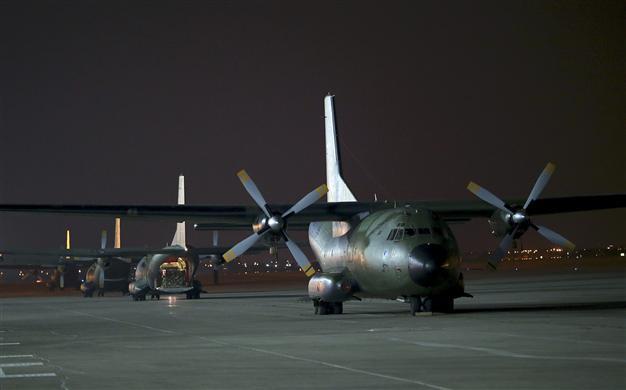Turkey joins anti-ISIL coalition, opens İncirlik for logistics ops
Murat Yetkin

German Bundeswehr Transall C-160 plane carrying humanitarian aid stands on tarmac at İncirlik airbase near Adana, August 15, 2014. REUTERS Photo
On Thursday Aug. 21, 2014, a U.S. Air Force F-15 requested an emergency landing in Turkey. It had been hit in its hydraulic systems during operations against the forces of the Islamic State of Iraq and Levant (ISIL) and was in no condition to reach as far as its original base in Qatar.Permission was granted by the Turkish General Staff to use the Batman air base in southeast Turkey, near the Iraqi border. Turkish F-16s escorted the U.S. plane for the Batman landing. For the repairs, a U.S. team of technicians relocated to Batman from the İncirlik air base near Adana, in southern Turkey, for a few days. The American jet then took off for Qatar, again escorted by Turkish F-16s until reaching the Turkish-Iraqi border.
A Turkish official source, who told me about the incident on condition of anonymity, underlined that permission was only granted because the life of a pilot was in danger and also out of solidarity between NATO members. “Otherwise,” the source said, “Turkey is keen not to take part in any active military operation in the region for the time being. But İncirlik is available for use for humanitarian and logistical operations within the struggle against ISIL.”
İncirlik is a Turkish Air Force Base co-operated by NATO. It is listed by the U.S. Air Force as being among its top Main Operating Bases facilities. Now, after U.S. President Barack Obama publicly named Turkey as part of the coalition to fight against the threat posed by one of the most violent formations of modern times, ISIL, Turkey has opened up the base - not for operational use, but logistics only. The issue was discussed on Sept. 8, during the visit of U.S. Defense Secretary Chuck Hagel to Ankara, where he met Turkish President Tayyip Erdoğan, Prime Minister Ahmet Davutoğlu and Chief of General Staff Necdet Özel. There was also a follow up call by the U.S. Secretary of State John Kerry to Turkish Foreign Minister Mevlüt Çavuşoğlu.
Actually, the shipment of non-lethal material to Iraqi Army and Kurdistan Regional Government (KRG) forces in Iraq through Incirlik and via Turkish air space has already started, according to Turkish and Western diplomatic sources.
“The Americans have not asked for the operational use of İncirlik anyway,” a Turkish diplomatic source explained. “We explained our position and they sympathized. We have to act with caution regarding the Turkish captives in the hands of ISIL.” The source was referring to the 49 Turkish citizens, including Consul General Öztürk Yılmaz, who have been held as captives by ISIL since the raid on Turkey’s Mosul Consulate building on June 11.
Turkey is now a part of the coalition against ISIL, along with the U.S., Britain, Germany, France, Italy, Spain, Hungary from Europe, Australia, and Saudi Arabia, Egypt, Jordan, Lebanon, Qatar, and Bahrein from the Arab geography. “The number is tending to increase,” the Turkish source said.
Turkey takes its place in the coalition with three functions for the time being:
1- Logistical and humanitarian-purpose use of İncirlik and other Turkish military bases.
2- Opening up the Turkish air space for humanitarian and logistical flights to support the anti-ISIL fight in Iraq (“But no armed flights, including drones,” the official underlines.)
3- Extra measures on border security. Turkey has a 910 km border with Syria, and a 384 km border with Iraq; both of which are rough terrains. Turkey has already been cooperating with its NATO allies against “foreign fighters” - those carrying American or European passports travelling via Turkey to join either ISIL or al-Qaeda - for the last few months. It seems now that the cooperation will expand to include more effective law enforcement measures.
Both Turkish and Western sources say the framework of the cooperation might change regarding the “new” U.S. strategy expected to be announced by Obama.











